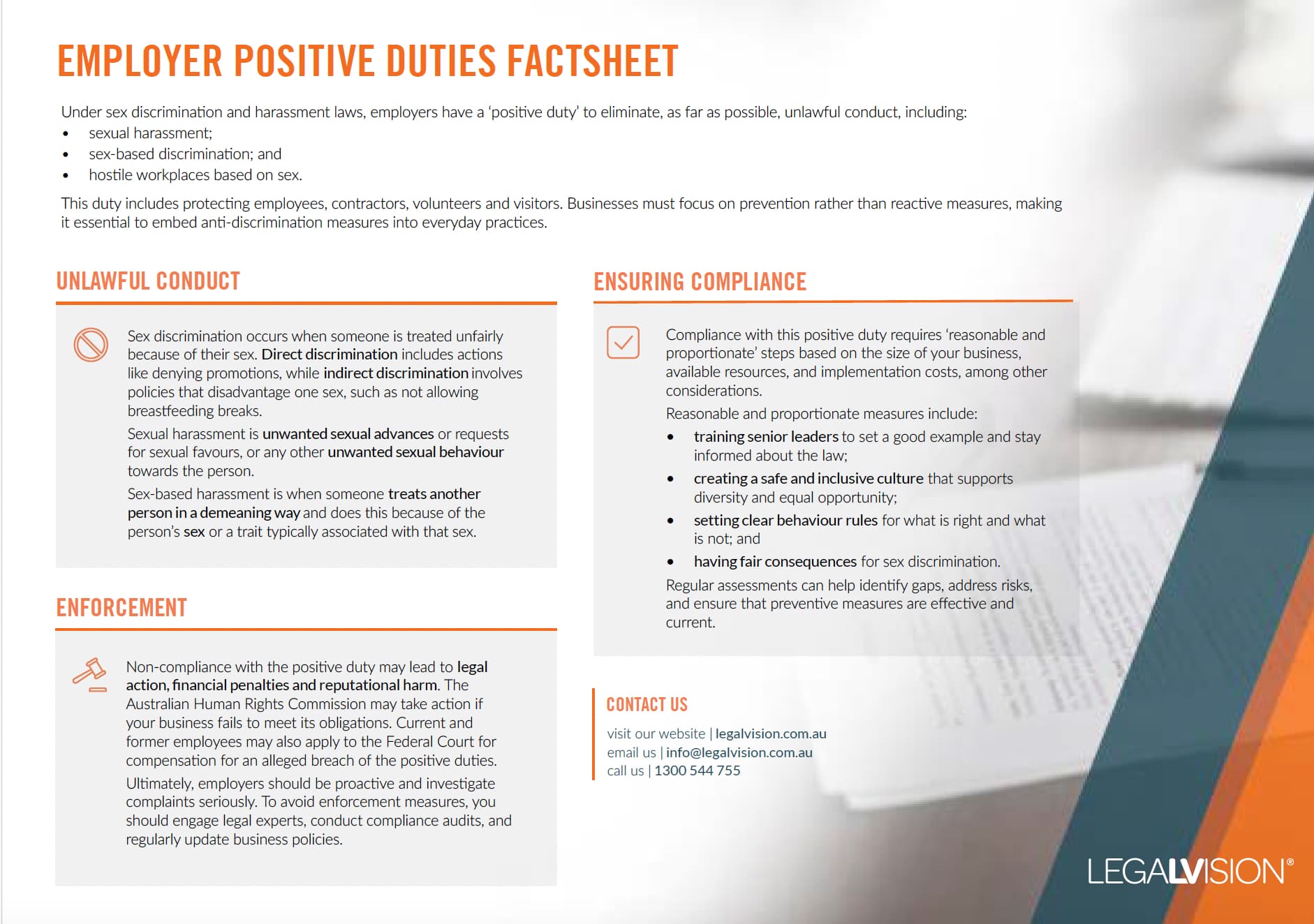In Short
- The Fair Work Act 2009 does not specify break entitlements, but most modern awards and enterprise agreements outline requirements for meal and rest breaks.
- Meal breaks are typically unpaid, while rest breaks are paid. The length and timing of these breaks depend on the applicable award or agreement.
- Employers must keep accurate records of employee work hours and breaks. Providing adequate breaks is also essential for workplace health and safety, helping to prevent fatigue and stress.
Tips for Businesses
Review the modern award or enterprise agreement relevant to your industry to ensure compliance with break provisions. Maintain precise records of employee hours and breaks to meet legal obligations. Prioritising regular breaks supports employee well-being and enhances productivity.
As an employer in Australia, it is essential to understand and comply with the legal requirements regarding providing breaks to your employees. Ensuring that your employees receive adequate rest and meal breaks promotes their well-being and increases productivity, safety and job satisfaction. The Fair Work Act 2009 (Cth) (the ‘Act’) and various modern awards outline the specific obligations for providing breaks. This article outlines various different types of breaks and your legal obligations for each one.
Meal Breaks
Under the Act, no specific provision mandates meal break entitlements. However, most modern awards include clauses requiring you to provide youir employees unpaid meal breaks.
It is important to note that the length and timing of meal breaks may vary depending on the specific modern award or enterprise agreement that applies to your workplace. Some awards may require longer or more frequent meal breaks based on the nature of the work or industry.
Rest Breaks
Similar to meal breaks, the Act does not explicitly address rest break entitlements. However, most modern awards include provisions that require employers to provide paid rest breaks to their employees.
Continue reading this article below the formRecord-Keeping Obligations
While the Act does not specify minimum break entitlements, it does impose record-keeping obligations on employers. Section 535 of the Act requires employers to make and keep employee records, including records of any breaks taken by the employee.
Furthermore, the Fair Work Regulations 2009, specifically Regulation 3.33, outlines the requirements for records relating to start and finish times and breaks. You must keep accurate records of the start and finish times of your employees’ work periods, as well as any breaks taken during those periods.

This fact sheet outlines employers’ ‘positive duty’ under sex discrimination laws, highlighting proactive measures to prevent unlawful conduct.
Work Health and Safety Considerations
In addition to the requirements outlined in the Act and modern awards, employers also have obligations under Work Health and Safety (WHS) laws to ensure the health and safety of their employees. Providing adequate rest and meal breaks can be considered a necessary measure to mitigate risks associated with:
- fatigue;
- stress; and
- other potential hazards that may arise from prolonged work without breaks.
Failure to provide reasonable breaks could be considered a breach of your workplace, health and safety obligations.
Consequences of Non-Compliance
Employers who fail to comply with the break requirements outlined in the relevant modern award or enterprise agreement may face legal consequences. Employees may be able to file claims for underpayment of entitlements or breach of workplace laws, which could result in financial penalties or orders for compensation.
Additionally, non-compliance with record-keeping obligations under the Act can also result in penalties. The Fair Work Ombudsman can issue compliance notices and pursue legal action against you if you fail to keep accurate employee records.
Key Takeaways
It is crucial for you to stay informed and compliant with the specific break requirements that apply to your workplace. Regularly reviewing the relevant modern award or enterprise agreement and seeking legal advice when necessary can help ensure that your business meets its obligations and avoids potential disputes or legal consequences. By providing adequate rest and meal breaks, you comply with legal requirements and contribute to a healthier and more productive workforce. Employees who are well-rested and able to take breaks will likely be more focused, engaged and better equipped to perform their duties safely and effectively.
If you need help understanding your obligations to provide breaks, our experienced employment lawyers can assist as part of our LegalVision membership. For a low monthly fee, you will have unlimited access to lawyers to answer your questions and draft and review your documents. Call us today on 1300 544 755 or visit our membership page.
Frequently Asked Questions
No, break entitlements are generally determined by modern awards or enterprise agreements, regardless of business size. However, some agreements may include flexibility provisions for small businesses, so it is essential to check the specific terms that apply to your workplace.
In most cases, no. You must ensure employees take them if a modern award or enterprise agreement mandates breaks. Allowing staff to work through breaks could lead to non-compliance and potential legal consequences, particularly if it impacts health and safety obligations.
We appreciate your feedback – your submission has been successfully received.











